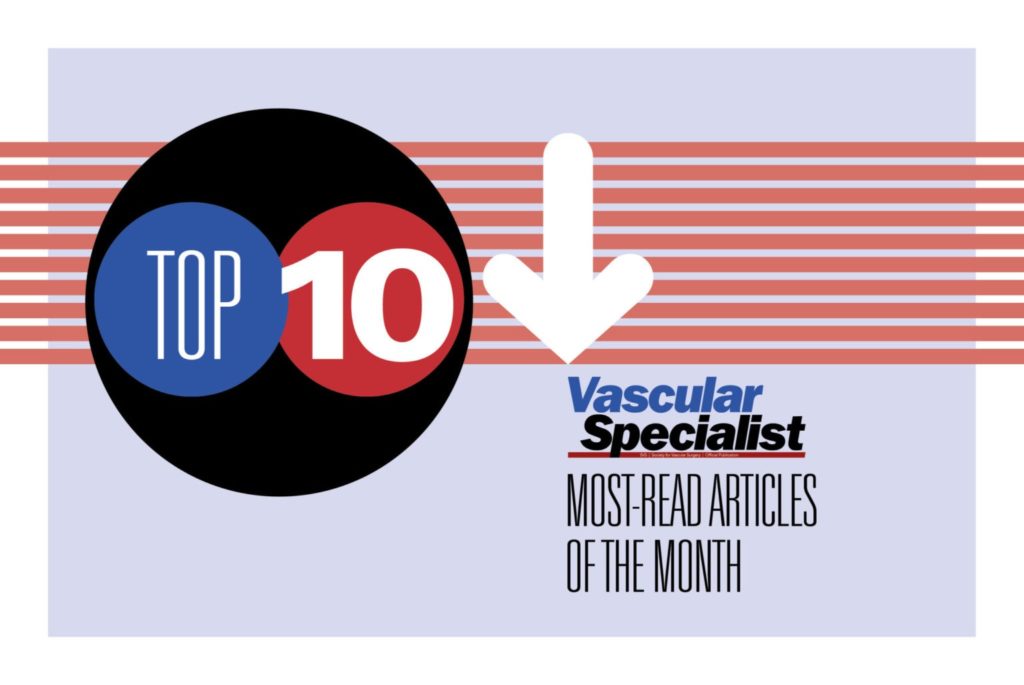 February’s top 10 includes a highlight from the 2022 Vascular and Endovascular Surgery Society (VESS) winter annual meeting and an interview with Melissa Kirkwood, MD, and colleagues at UT Southwestern in Dallas, Texas, regarding the lightweight shield designed to reduce radiation dose during complex endovascular procedures. Additionally, this month’s highlights include the important discussion of the silent epidemic—burnout—and interesting findings of index atherectomy interventions for claudication.
February’s top 10 includes a highlight from the 2022 Vascular and Endovascular Surgery Society (VESS) winter annual meeting and an interview with Melissa Kirkwood, MD, and colleagues at UT Southwestern in Dallas, Texas, regarding the lightweight shield designed to reduce radiation dose during complex endovascular procedures. Additionally, this month’s highlights include the important discussion of the silent epidemic—burnout—and interesting findings of index atherectomy interventions for claudication.
1. VESS 2022: Novel use of TCAR to treat complex brachiocephalic disease shown to be effective, researchers report
A “unique” case series of patients undergoing transcarotid artery revascularization (TCAR) in which the system was put to novel use for proximal intervention or incorporated in a hybrid approach to complex brachiocephalic disease demonstrated it to be effective in “providing safe, comprehensive treatment solutions,” the 2022 Vascular and Endovascular Surgery Society (VESS) winter annual meeting in Snowmass, Colorado (Jan. 27–29) heard.
2. Radiation protection: Lightweight shield designed to reduce dose during complex endovascular procedures gains ground
It all started with a “we should do research together; this is fascinating.” The result—the production of a prototype eyewear that decreases radiation to the eye and brain—is the more-than-decade-long toil of Melissa Kirkwood, MD, and colleagues at UT Southwestern in Dallas, Texas. From conference podium to conference podium, through endless research studies and paper-writing, Kirkwood has put in the miles to get the disposable, lightweight shield patented. Here, the UT Southwestern vascular chief tells Vascular Specialist about her journey and production of the “much-needed” device aimed at helping surgeons and interventionalists combat radiation exposure.
3. Index atherectomy interventions for claudication ‘is associated with higher’ reintervention rates vs. other technologies
Atherectomy use during index peripheral vascular interventions in claudicants is associated with higher reintervention rates when compared to other technologies, a newly unveiled study by Caitlin Hicks, MD, and colleagues at Johns Hopkins Hospital in Baltimore, Maryland, shows.
4. Medtronic issues voluntary recall for TurboHawk Plus directional atherectomy system
On Feb. 7, Medtronic issued a notice emphasizing that the same warnings and precautions issued for the HawkOne directional atherectomy system also apply for the company’s TurboHawk Plus 6Fr system due to design similarities. The company stresses that this is not a new issue.
5. Interview: Combating the problem of spin, or overinterpretation, in randomized controlled trials
The presence of spin, or overinterpretation, in scientific papers that ultimately demonstrate statistically insignificant findings had been gnawing away at Thomas Forbes, MD, for quite some time, here he speaks to Vascular Specialist.
6. Complex TAAA: US ARC IDE registry reports better survival vs. real-world data after endovascular repair
Patients treated in Food and Drug Administration (FDA)-approved investigational device exemption (IDE) trials for complex thoracoabdominal aortic aneurysms (TAAAs) in the U.S. Aortic Research Consortium (ARC) had better 30-day and one-year survival compared with those recorded in the real-world Vascular Quality Initiative registry, new data presented at the 2022 Southern Association for Vascular Surgery (SAVS) annual meeting revealed.
7. New data add to body of evidence highlighting ‘importance’ of vascular surgery in trauma center setting
Another study has emerged showing vascular surgery’s heavy intraoperative consult activity in a level 1 trauma center setting, lending further fuel to the “vascular firefighter” analogy.
8. Worldwide TCAR analysis provides ‘roadmap’ to evaluate future training approaches
An analysis of the worldwide experience of transcarotid artery revascularization (TCAR) has produced key objective proficiency metrics and an analytic framework to assess adequate training for the procedure. “Training on cadavers or synthetic models achieved clinical outcomes, technical outcomes and proficiency measures for subsequently performed TCAR procedures similar to those achieved with training using traditional proctoring on live cases,” Brajesh K. Lal, MBBS, professor of vascular surgery at the University of Maryland, Baltimore, and colleagues conclude in the Journal of Vascular Surgery.
9. Patients in Florida with complex aortic pathology gain unique access to F/BEVAR
Patients with complex pararenal and thoracoabdominal aortic aneurysm (TAAA) disease are faced with limited treatment options outside of one of the most technically and physiologically demanding operations on a vascular surgeon’s schedule: open repair, with fenestrated/branched endovascular aneurysm repair (F/BEVAR) offering a safer option.
10. Silence is golden—but does self-imposed silence lead to burnout?
Bhagwan Satiani, MD, outlines the “silent epidemic” associated with burnout among surgical residents and other physician employees.












